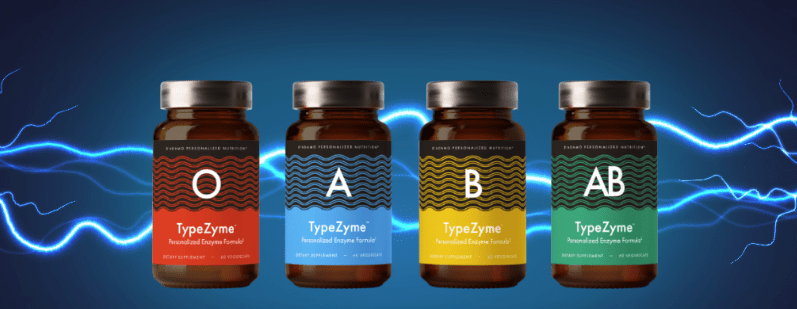Health and Wellness
Should I Take Digestive Enzymes Based on My Blood Type?
Just like your skin tone and eye color, your blood type is something you’re born with. It runs in your family and is determined by your parents’ blood types. You’re also more likely to share the same blood type with people that have the same ethnic background that you do.
Memorizing your blood type is critical for all sorts of reasons, from knowing who you can accept blood transfusions from to who you can donate your blood to. And now, as scientists do increasingly more research on how a person's blood type can affect their health, there's even more of an incentive to pay attention to whether you're A, B, AB, or O—and whether you're positive or negative, too.
For example, recent studies have found that a person's blood type can mean anything from an increased risk of depression to a higher likelihood of developing diabetes.

Wondering who pioneered this science in the first place? In 1909, Austrian scientist Karl Landsteiner became the first person to properly identify the four main blood groups. It's thanks to his research that we now know which blood types to use (and which not to use) with patients in need of transfusions. In 1930, he was rewarded for his contributions when he was given the Nobel Prize for Physiology or Medicine.
The key to your individuality lies in your blood type. Your blood type establishes unique Avoid and Beneficial foods, identifying a diet optimized for you.
For healthy digestion, it is important to maintain a healthy diet rich in nutrients and to manage stress levels. Some people may also benefit from digestive enzyme supplements, which help to improve digestion and nutrient absorption. Digestive enzymes are proteins that are responsible for breaking down the foods we eat into smaller molecules that can be absorbed by the body. These enzymes are produced by various organs in the digestive system, including the pancreas, stomach, and small intestine.
As we get older, the organs responsible for producing digestive enzymes begin to function less efficiently. For example, the pancreas may produce fewer enzymes, leading to a decrease in the body’s ability to break down fats and proteins. Because of this, it may become less efficient at absorbing nutrients from food as we age.
Poor diet, chronic stress, and other lifestyle factors can contribute to a decrease in the production and effectiveness of digestive enzymes. This can lead to a variety of digestive symptoms, including bloating, gas, and abdominal discomfort. It can also contribute to malnutrition, as the body may not be able to absorb all of the nutrients from its food.
Your blood type is different. Your diet is different. Your supplements should be too.
There are thousands of digestive enzyme supplements out there and available to the general public. Most are rudimentary; however, a few are formulated in a manner that is quite imaginative and inspired. Particularly in situations where the person’s absorption abilities have become compromised, such as with aging, and a slew of digestive complaints ranging from the rare to the everyday variety, it is important to use the right supplements.
Although life is complex, solutions should not be unnecessarily complicated. When we call something ‘complicated’, we are simply describing something complex that we do not have a well-developed understanding of.
However, just like the process of optimizing one’s food selection, the typical digestive enzyme formulas lean too heavily on the one-size-fits-all mantra. Perhaps it eases inventory control or simplifies marketing. But like most clinical observations we’ve made over the years, and as they say on social media, ‘it’s complicated.’
Readers of 'Eat Right for Your Type' books know well that most of the significant differences between the blood types play out in the gut. However, close to three decades after the publication of Eat Right for Your Type, many clinicians and nutritionists are surprisingly unaware of these extensively reported differences. For example, blood type and secretor status have a major influence on the bacteria that inhabit our digestive tract, the so-called microbiome.
Variations between the blood types regarding the production and array of digestive enzymes have been extensively reported in the medical literature.
The level of certain digestive enzymes can vary by as much as a four-fold difference when one considers just blood type and secretor status.
That’s why it was important to develop a line of enzymes that took the strengths and weaknesses of each blood type into account. After more than two years of development and testing, the new TypeZyme formulas are here.
These formulas have been tested for potency and screened for heavy metals and unwanted microbial activity. The individual ingredients have been sourced from around the world and selected for maximum bioactivity. We believe these are the best digestive support formulas available.
Let’s take a look at each formula:

TypeZyme A
Adequate stomach acid levels, critical for initiating the breakdown of animal protein, are often lacking in blood type A. This formula uses betaine HCL as a gentle assist to the first stage of protein breakdown. Betaine is a substance that’s made in the body. It’s involved in liver function, and cellular reproduction, while also helping the body metabolize an amino acid called homocysteine – an added plus for type A, due to the link between homocysteine and artery disease, a major risk factor for this blood type. To support the second stage of protein digestion, TypeZyme A employs two protein-busting enzymes, a standard protease, and a special acid-stable form of protease as well. Because type A often has the lowest levels of critical intestinal enzymes known as phosphatases, TypeZyme A includes lipase in the formula to assist in fat breakdown. Finally, the formula rounds out with a synergistic dose of the plant enzyme bromelain, which helps condition the gut and acts like a gentle detergent throughout the digestive system.
TypeZyme AB
Although you could describe the blood type AB food plan as the ‘best of both kingdoms,’ there are excellent reasons why it was called ‘The Enigma’ in Eat Right for Your Type. Type AB works like type A here, type B there, and type AB everywhere else. Because of this, TypeZyme AB was developed to ‘cover all the bases,’ but in a way that also respected the unique characteristics of this rare blood type. Like blood type A, type AB requires fat-breakdown support, so the formula features a significant dose of the fat-digesting enzyme lipase. Like type O, Type AB can have difficulties breaking down starches, so TypeZyme AB packs a significant dose of the starch-breakdown enzyme amylase, an enzyme that is normally found in saliva and the upper intestinal tract. As with type B, which has shown good clinical success with an old, time-tested digestive aid, ox bile, TypeZyme AB has a synergistic amount of this important fat emulsifier. Finally, the formula rounds out with a synergistic dose of the plant enzyme bromelain, which helps condition the gut and acts like a gentle detergent throughout the digestive system.
TypeZyme B
Healthy fats are vital for the proper function of the nervous and immune systems of blood type B, but stress, aging, and illness can block the adequate production of critical elements known to be required for proper lipid breakdown and assimilation. That’s why TypeZyme B, like the type AB and A formulas, uses a unique combination of ox bile and lipase to activate the production of critical fat-busting machinery. Breakdown of starches can be a problem with type B, so TypeZyme B supplies a significant dose of high-activity amylase, an enzyme that helps break down sugars and aids in gut repair. Like type O, the proper diet for type B requires significant protein, the breakdown of which can diminish with age and genetics. In both blood types, we’ve seen very good clinical success using pancreatin, a mixture of several digestive enzymes produced by the secreting cells of the pancreas. Unique to TypeZyme B however, is the use of pancreatin from sheep sources, versus the type O formula, which uses pancreatin derived from cattle.
TypeZyme O
Normally a digestive powerhouse, type O can easily trip up with its breakdown and metabolism of carbohydrates. Thus, while TypeZyme O provides general protein and fat breakdown support via the inclusion of ox bile and bovine pancreatin, the main focus of the formula is to enhance carbohydrate breakdown, a critical function for this blood type, and whose improper function typically results in bloating, dysbiosis, and weight gain. It does this by synergizing two critical enzymes needed for proper carbohydrate metabolism: amylase and cellulase. The amylase enzyme helps the body to breakdown carbohydrates. It is normally made by the pancreas and salivary glands in the mouth. Cellulase aids in the breakdown of cellulose, the main constituent of plant fiber and roughage. Cellulase also helps in the breakdown of harmful microbial biofilms, which can lead to increased inflammation in this blood type. Finally, cellulase helps to release healthy antioxidant compounds otherwise trapped in the food.
Body-Field Scan
Ready to find out what's impacting your energy levels by using our bioenergetic scanning technology. Check out your body’s energy with a Body-Field scan and gain deeper insight into your holographic self with our certified Bioenergetic Practitioner. For an In-Clinic visit click here, or, for a Telehealth (remote) session click here.
We offer a completely new, alternative and bioenergetic health care approach based on 21st century science, technology and quantum physics with personalized, holistic therapy solutions such as, NES body-field scan & therapy, miHealth biofeedback, PEMF, Scalar Wave, Rife and Vibroacoustic (VAT) healing modalities that can restore optimal health and well-being throughout the body, mind and spirit in the most natural way. Let us help you restore your health and energy!










